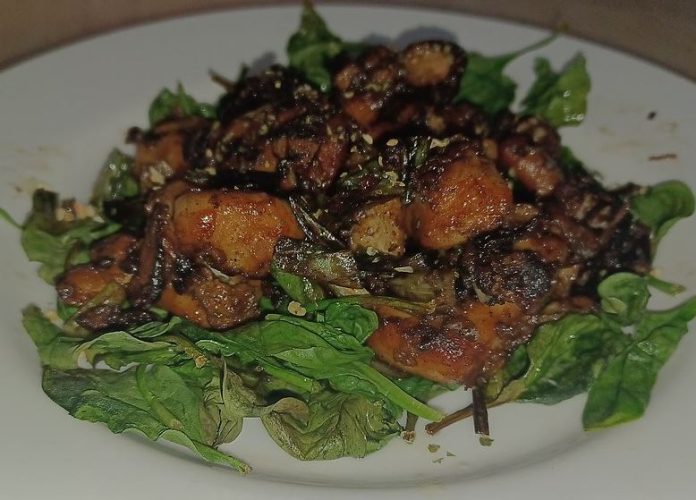By Alexandria Kenney, AsAmNews Intern
A group of chefs, dieticians, and food professionals is demanding the New England Journal of Medicine reconsider its use of the phrase “Chinese Restaurant Syndrome” to refer to symptoms reportedly associated with the seasoning MSG.
Questions about the potential negative impact of MSG began in 1968 when Robert Ho Man Kwok, a senior research investigator with the National Biomedical Research Foundation, detailed symptoms he had been experiencing after eating Northern Chinese cuisine.
“The most prominent symptoms are numbness at the back of the neck, gradually radiating to both arms and the back, general weakness, and palpitation,” Kwok wrote.
What remains unknown is whether the symptoms described by Kwok and other doctors and academics are necessarily caused by MSG, or whether there was another culprit.
The Food and Drug Administration (FDA) currently classifies MSG as safe.
The Ajinomoto Group was founded in 1909 after Kikunae Ikeda invented MSG the year prior and began a business to sell his new seasoning. With support from Ajinomoto, Asian Americans in the food industry sent a letter to the Journal asking why recent efforts by the publication to rectify its history of bias against marginalized groups did not include a correction for the naming of Chinese Restaurant Syndrome.
Signee Kat Lieu, who has a doctoral degree in health science from Drexel University, spoke with AsAmNews about how negative narratives around Chinese food, including titles like Chinese Restaurant Syndrome, tormented her from a young age.
“It’s been 50 plus years since the New England Journal of Medicine had coined that term. … When I use MSG in my content, I get comments like, ‘Why? Isn’t that bad for you? Why are you doing this? You shouldn’t be using MSG. People get hurt from it. People are allergic to it,’” said Lieu who is both Chinese and Vietnamese.
She added that the backlash from her MSG use makes her feel excluded from the food community, as her food is perceived as lower quality or less healthy than foods by non-Asian creators. The stigma around Asian, especially Chinese, cuisine and chef, she says, makes media and the public gravitate towards non-Asian chefs for Asian recipes, which Lieu said is not right.
But the fear only brought out Lieu’s desire to showcase Chinese ingredients and flavors, inspiring her to start Subtle Asian Baking on Facebook during the pandemic. She said the group can be partly credited for the recent uptick of Asian ingredients in baking, like miso and ube.
“My goal, really, is so that people (who) grow up looking like me will feel safer in the food world and be very bold and brave to create — to make food with any ingredient without feeling stigmatized or shameful,” Lieu told AsAmNews.

Another signee Cara Harbstreet, a registered dietician and independent contractor with the Ajinomoto Group with a master’s degree in dietetics and nutrition from the University of Kansas Medical Center, explored the history of MSG with an aunt who works in academia and has previously studied the seasoning in her own studies. Like Lieu, Harbstreet noticed that social media comments veered negative when a creator would use MSG in their cooking.
Fueled by curiosity around the seasoning as well as her identity as a biracial Korean American, Harbstreet set out to understand the controversy that seemed to surround MSG. Harbstreet said that research around MSG prior to Kwok’s letter in 1968 was limited.
So Harbstreet broke down the molecule into its component parts. She said that a single sodium paired with the amino acid glutamate is not sufficient to induce a reaction, which requires a complete protein. She also added that glutamate is naturally occurring in the body but noted that this does not guarantee health benefits — a common fallacy in health and nutrition.
But she also recognized that those who report symptoms after consuming MSG should not be invalidated in their experiences. Instead, Harbstreet said it may be more productive to deduce other potential causes of a patient’s reaction.
But even among academics and food professionals, some still associate MSG with negative side effects, though most media and research coverage seem to conclude that MSG is relatively harmless.
While the Food and Drug Administration (FDA) considers MSG safe, it requires the ingredient to be listed as monosodium glutamate on ingredient labels.
The FDA also wrote that headache and nausea were reported with MSG, but it could not confirm whether the relationship was causal. In 2018, the International Headache Society removed the seasoning from its list of potential headache inducers, according to MigraineAgain.
Studies in the past decade have arrived at different conclusions. Some say previous studies measured unrealistically high amounts, generally above the 3-gram threshold — a high dosage level where some may have reactions. For reference, salt is generally not recommended past 5 grams. Other studies have relied on animal testing or injection into the bloodstream to study the impact of MSG, which critics say inaccurately mimics the way MSG is consumed. In normal use, current studies conclude previous claims are largely inconclusive due to study designs and require further examination.
One study which lists muscle tenderness, muscle pain, and reproductive issues as side effects, uses a range of 57 to 150 milligrams per kilogram of body weight. For anybody over 115 pounds, 57 grams per kilogram exceeds the 3-gram mark. The same applies to anyone over 44 pounds with the 150-gram dosage.
AsAmNews asked Tia Rains, vice president of Science, Innovation, and Corporate Affairs for Ajinomoto Health and Nutrition North America, about potential conflicts of interest when the company conducts research around MSG as well as around its financial involvement in MSG-related campaigns. Rains did not answer about the company’s finances but said it has been involved extensively in MSG campaigns, including one that changed the definition of Chinese Restaurant Syndrome in Merriam-Webster to note its derogatory nature.
“The research teams work closely with external experts, all while maintaining transparency and guidance to high-quality standards,” Rain wrote. “Independent research, like studies from the Federation of American Societies for Experimental Biology (FASEB), support the safety of MSG, confirming that it’s just as safe as the glutamates found naturally in foods like mushrooms and tomatoes.”
AsAmNews reached out to the New England Journal of Medicine for comment but did not receive one in time for publishing.
Ultimately, the seasoning is a flavor enhancer that is by no means required for any given recipe. Therefore, when AsAmNews asked who should and should not have MSG, Harbstreet said it is a matter of personal choice.
AsAmNews is published by the non-profit, Asian American Media Inc.
We’re now on BlueSky. You can now keep up with the latest AAPI news there and on Instagram, TikTok, Facebook, YouTube and X.
We are supported by generous donations from our readers and by such charitable foundations as the Robert Wood Johnson Foundation.
You can make your tax-deductible donations here via credit card, debit card, Apple Pay, Google Pay, PayPal and Venmo. Stock donations and donations via DAFs are also welcomed.



Were there any similar symptoms with Adolf’s Meat Tenderizer? In 1962/63, I worked at a steakhouse that used a lot of the tenderizer on beef from Australia. I don’t know of any customer complaints about health issues after eating the steaks.
(Correction)
Maybe Kwok was reacting to Northern Chinese food. Geez, it could be anything… Wondering why he called out Northern Chinese food?